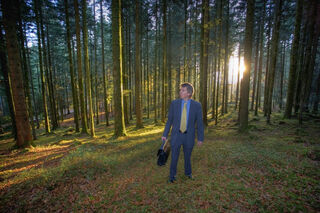Intelligence
Why Can't We Handle the Truth?
While knowing the truth has an appeal, it serves a higher master.
Posted August 18, 2020

Seeking Truth (Sort of)
"And ye shall know the truth, and the truth shall make you free." —Jesus, from John 8:32 of the New Testament
As discussed in my previous blog post, we need the truth to understand what is really going on in this world, so that we can make skillful decisions. Through seeing the world more clearly with the light of truth, we can avoid some of the potholes along this journey of life. In this sense, the truth does set us free because the darkness of ignorance, of not knowing, restricts us. Even so, it's often true that we don't seek to know the truth. We simply don't want to know the facts or are blind to them. This begs the question: If the truth helps us navigate life more effectively, why wouldn't we want to know it?
Lt. Daniel Kaffee: “I want the truth!”
Col. Nathan Jessep: “You can’t handle the truth!”— From the movie A Few Good Men
Assuming we could even agree on a definition of "truth," the list of reasons we can't or don't wish to know the truth would be quite long and well beyond the scope of this series of blog posts. For example, psychologists have identified scores of cognitive biases that distort our perceptions of reality and affect our decision-making and behavior. Why do we have sense perceptions and brains that, in a manner of speaking, deceive us? Why would they hide truth from us?
"Against our will, our souls are cut off from truth." — Marcus Aurelius, Meditations
One of the reasons that we have difficulties with perceiving truth, with seeing reality, has to do with the purpose of truth. Truth isn't desirous for its own sake, it serves a higher master. The purpose of truth is rooted in the purpose of life itself.
A Purpose of Life
"Why are we here? Because we're here. Roll the bones." — From the song Roll the Bones by Rush
There's not one unequivocal truth as to why we exist. Philosophers, theologians, and scientists can argue endlessly on this topic without ever agreeing on the true answer. But perhaps we can agree that a truth (as opposed to the truth) of our existence is...drum roll, please...to continue to exist.
We have a built-in evolutionary drive to survive because, well, it evolved this way. If it hadn't, we wouldn't be here! Even if you experience this observation as an anticlimactic answer as to a purpose of life, perhaps you will nonetheless agree that it is true — or even partially true.
We share this drive to survive with all living creatures, including plants. For instance, as we know, plants need sunlight to survive and thrive. If a sun-hungry tree or plant germinates within a shaded area, it will grow toward the light. It doesn't "choose" to do that. It is a built-in mechanism. It is fundamental to its very existence. Similarly, humans, like virtually all animals, have a fight-flight-freeze instinct to help us avoid danger, especially predators, so that we may live another day. As humans, we have the desire to be safe and healthy, and we want this for our children and loved ones as well. This is inherent, and it has to be this way in order for us to survive as a species.
For our hunter-gatherer ancestors, what was "true" in the world was what helped them survive. As Harvard cognitive psychologist Dr. Steven Pinker noted in How the Mind Works, "Our minds evolved by natural selection to solve problems that were life and death matters to our ancestors, not to commune with correctness." Our ancestors needed to be able to discriminate friend from foe, healthy from unhealthy, and safe from dangerous (e.g., "It is good to eat this and bad to eat that."). In this sense, discrimination was a good thing because it meant distinguishing safe (e.g., eating a portabella mushroom) from unsafe (e.g., eating a deathcap mushroom). Within an evolutionary framework, ignorance of what is true or real could be dangerous or deadly.
In addition, in order to survive, it was critical for our ancestors to learn to make predictions based on available information (e.g., If I hide long enough by this water hole, I will likely be able to kill game for dinner!). Not knowing, or uncertainty, would often spark the curiosity to explore, discover, and learn (e.g., "I wonder if there could be food or water over this hill? Let me check..."). It motivates us to move from a state of not knowing to knowing because that has survival value. In other situations, uncertainty would elicit anxiety or fear so that we would know to avoid potential danger. (e.g., "It's dark, and something is making strange noises over there in the bushes. I'd better get away from it!").
Don't Let Truth Get in the Way of Survival
Thus, our ancestors didn't need to see the world for what it really was. They just needed to know enough to help them survive. For example, the world looks flat. It looks like the sun rises in the sky and is a relatively small object. Our eyes (or our brains) deceive us though. The Earth, as well as other planets, are roughly spherical in shape. A million Earths could fit inside the Sun, and it is 93,000,000 miles away from us.
But such "truths" were totally unnecessary for our hunter-gatherer ancestors to survive and reproduce. Likewise, our ancestors didn't need quantum physics to survive, just basic Newtonian physics. For instance, they needed to understand that falling off of a cliff would be bad. They didn't need to understand that Schrödinger's Cat could be simultaneously alive and dead in a quantum universe. Rather, they just needed to know if the cat could hurt them...or was edible.
Since survival was the goal, erring on the side of misperception or self-deception was sometimes beneficial because it increased our likelihood to survive. For instance, while foraging for food, we might misperceive a long, thin vine to be a snake because it would be safer to err on the side of caution. If we jump back to evade it, and it turns out to be nothing, we live another day. But if we make the mistake of not jumping back, and it is a venomous snake, we could be dead.
Similarly, "stranger danger" was an important instinct for our ancestors. Sure, that stranger might be friendly, but first contact could result in one's death...or even the death of one's entire family or tribe. So, feelings of fear, trepidation, and caution at first contact with strange creatures, situations, or other humanoids would have been common. In a sense, we would misperceive the level of threat, not see "truth," because, well, such an exaggerated fear could save our lives.
Importantly, most of our evolutionary history, until about 12,000 years ago, was spent in nomadic, hunter-gatherer tribes. Thus, our brains evolved over the course of hundreds of thousands of years (or millions of years, depending on where you start counting) to survive in these tribal, nomadic conditions. Our brains, which evolved for such a different ancestral world, are not always best-suited for the challenges of modern society.
In my next blog post, I will explore how the concept of evolutionary mismatch explains some of the problems we are experiencing on both individual and societal levels.




